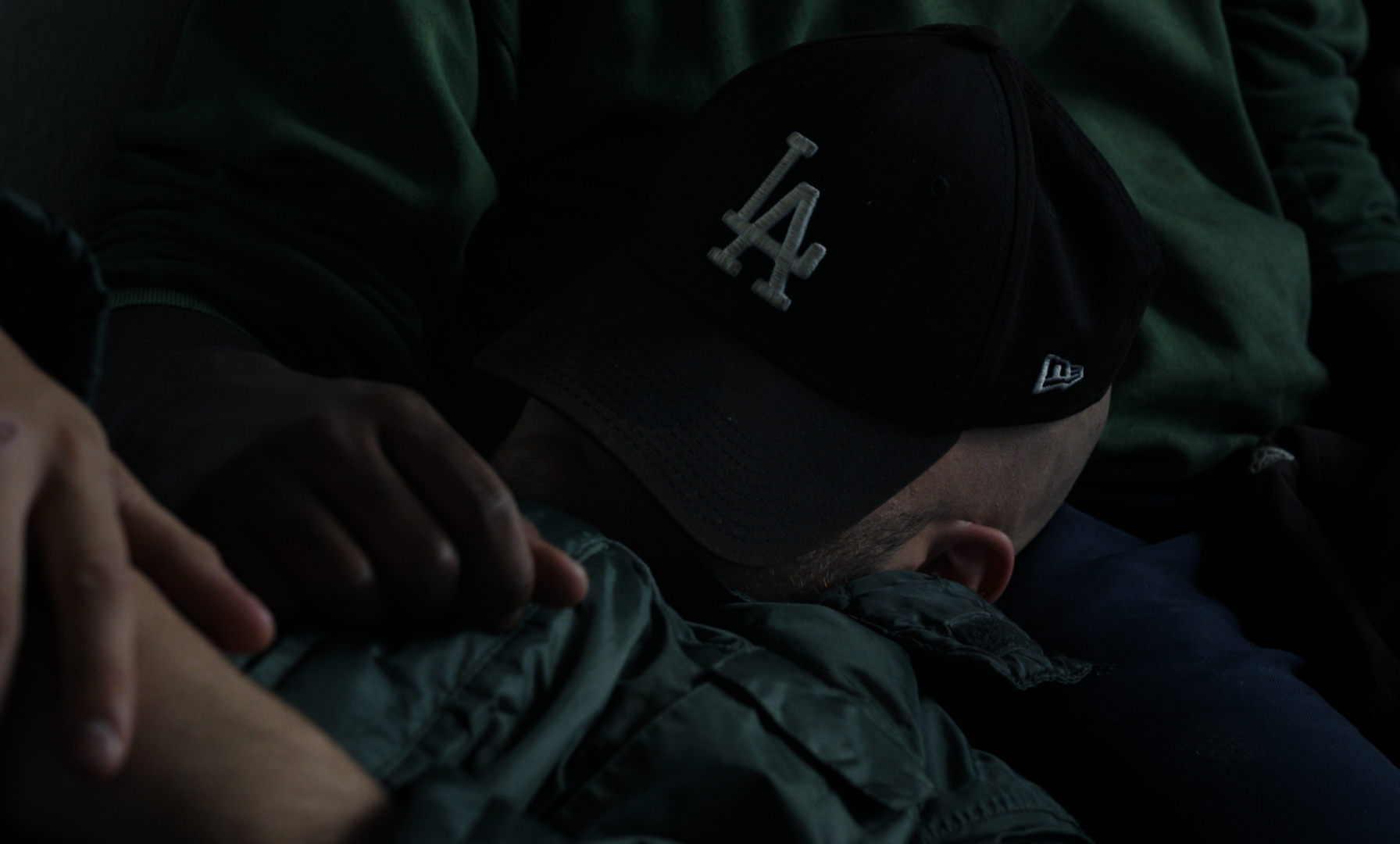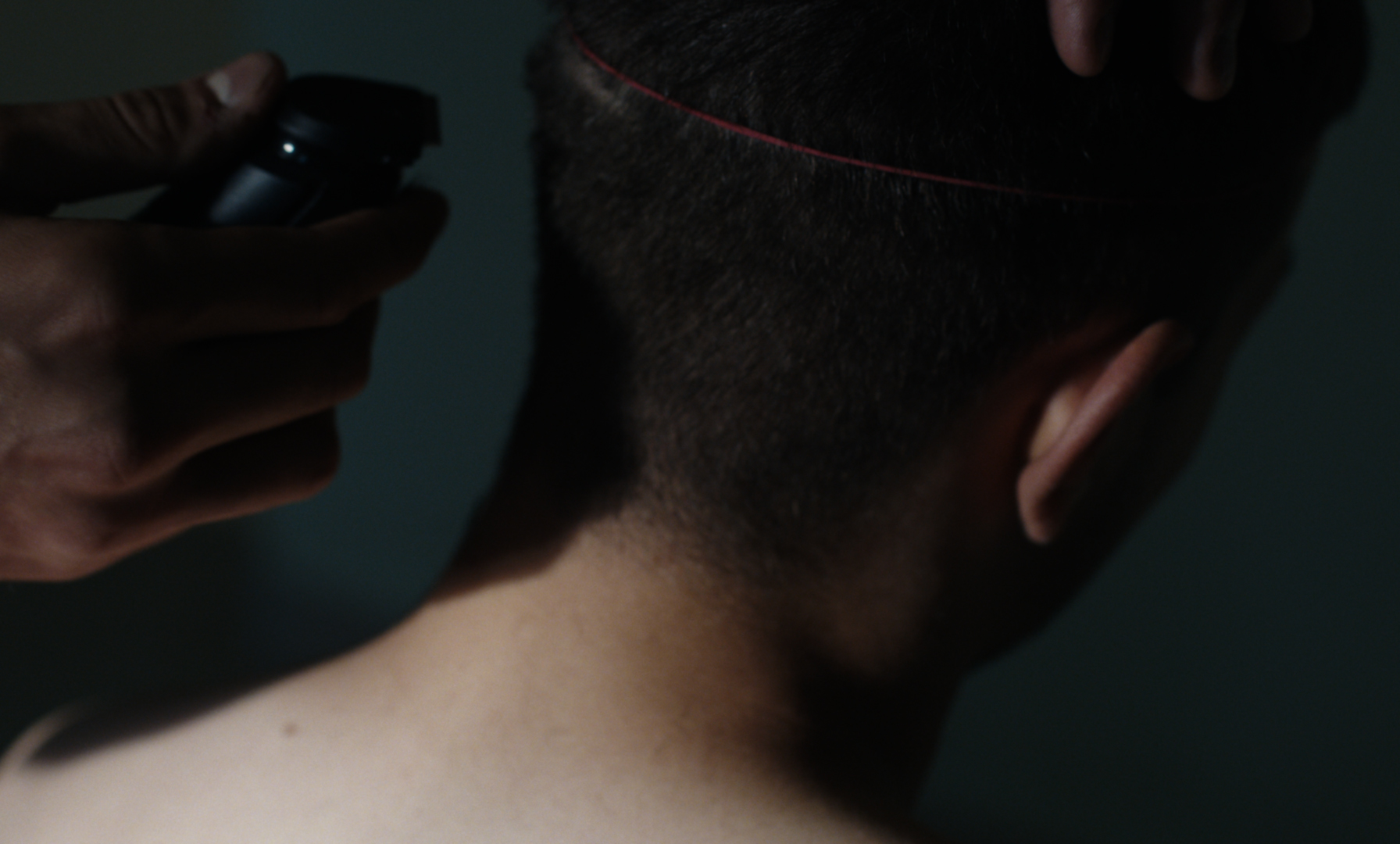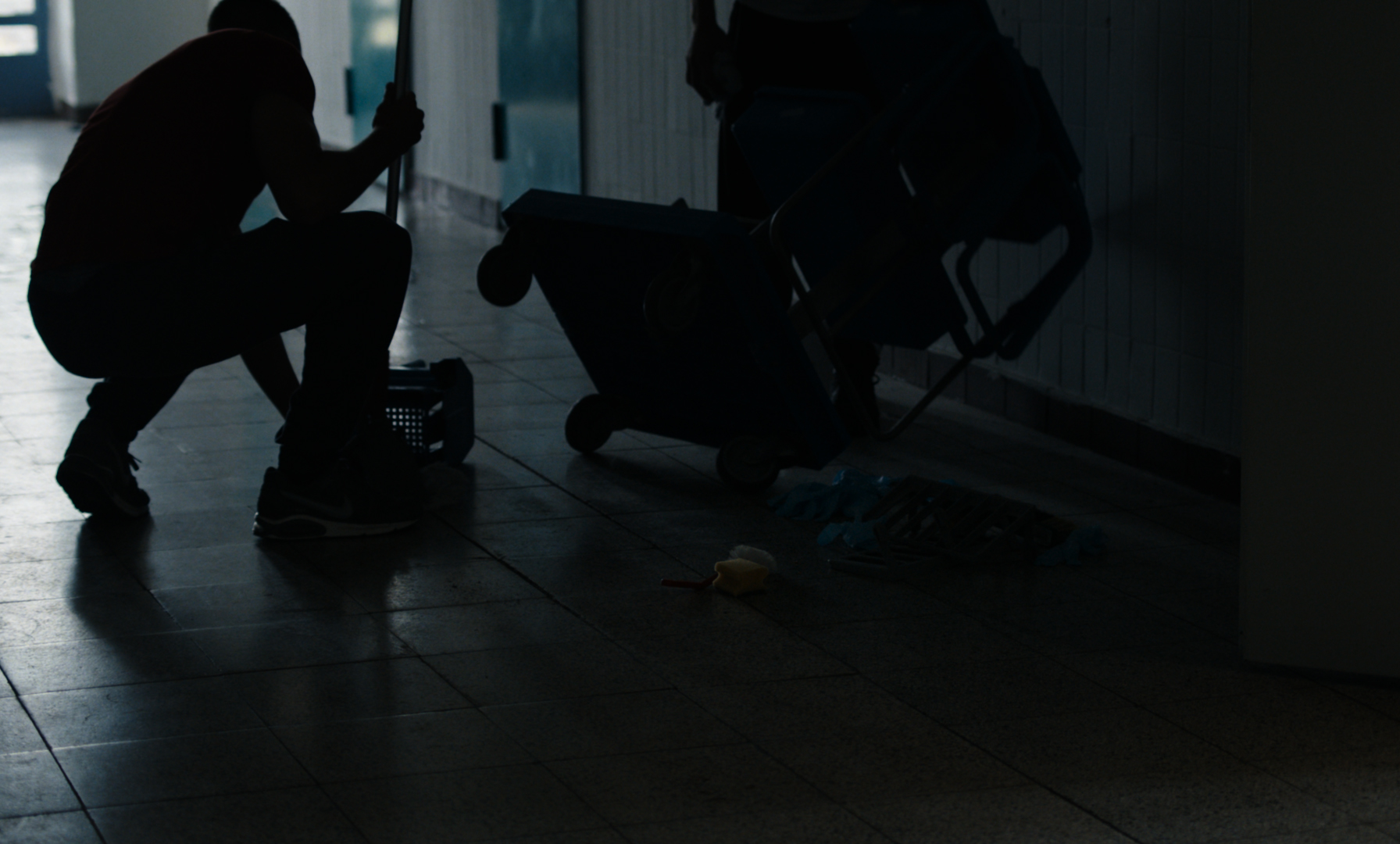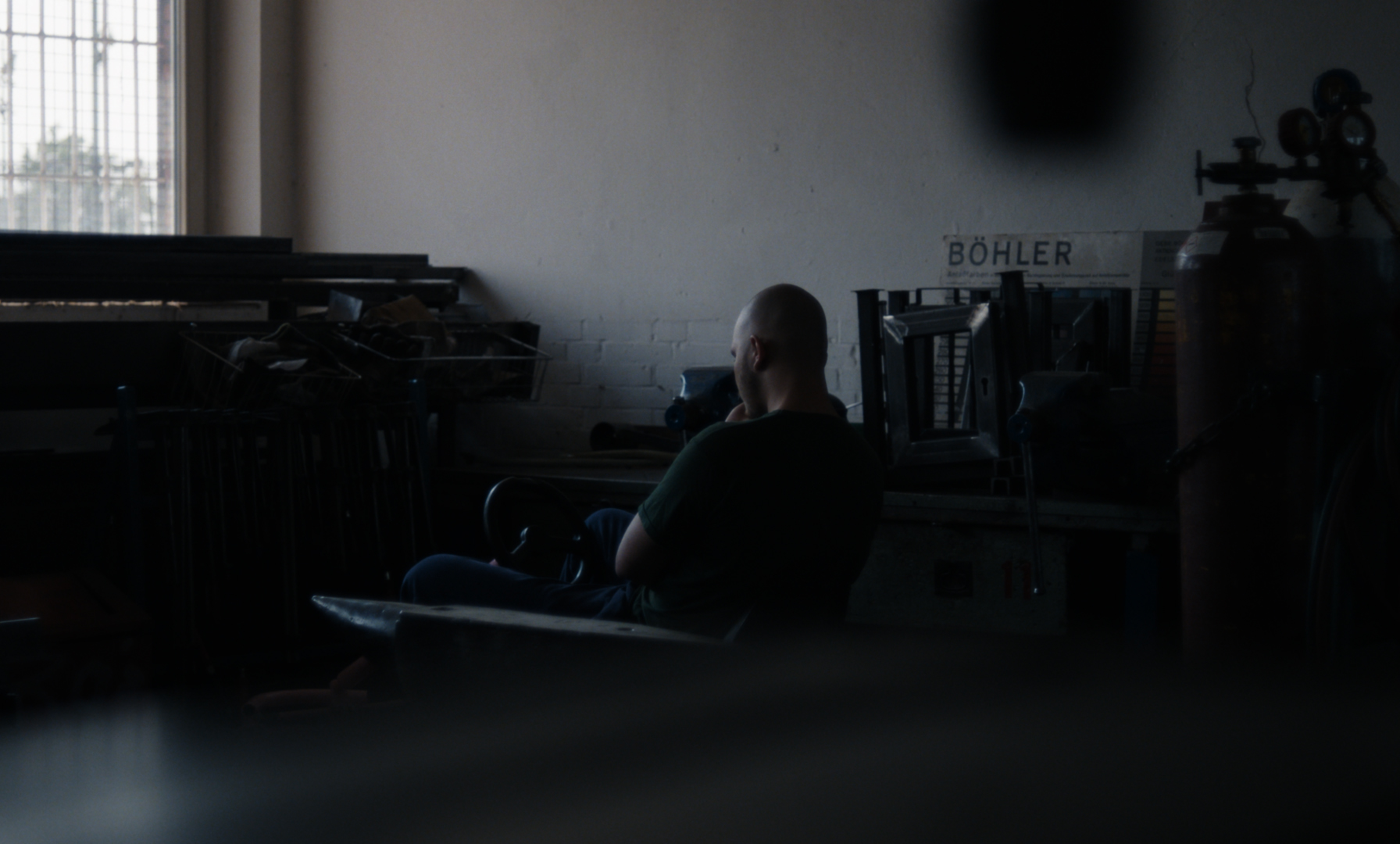Nach zwei Stunden waren zehn Minuten vergangen
After Two Hours, Ten Minutes Had Passed
(Fiction, 19‘ 30‘’, Color, 1,66/1, HD)
Time as punishment– of juvenile inmates and bodies that become heavy in prescribed spaces.
SYNOPSIS: Eating, waiting, haircutting, cleaning, telephone- and bedtime. The perennial daily routine of a juvenile detention center brings about a clotting of time. Bodies are transformed into vehicles, lethargically moved from workshops to single-person cells, down hallways into outdoor areas, from armchair to couch. Nothing makes a difference. Breathing, walking, sitting, lying down again. Existence in a comatose state. The film observes this heterotopic cosmos, picturing a perpetual dissolution. It tells a story of bodies left behind, of an undefined longing. A longing for something different. For an outside so yonder that even the dreamers do not know any longer, if it has even ever existed as such.
Language: German
Subtitles: English / Italian
CAST:
Anonymous – Inmates
Gaso Abdulrahman – Girlfriend
Karsten Krause – Prison Guard
CREW:
Written & Directed by: Steffen Goldkamp
Camera: Tom Otte
Sound: Karsten Krause & Jakob Spengemann
Additional Camera: Paul Spengemann & Karsten Krause
Editing: Jelena Maksimović & Steffen Goldkamp
Production Manager: Ethem Cay
Sound Design: Jakob Spengemann
Grading: ARRI Media GmbH
Colorist: Steffen Paul
Sound Mixing: Stephan Konken
Special Effects: Wassili Franko
Production: Spengemann Eichberg Goldkamp Hans
Funding by Filmförderung Hamburg Schleswig-Holstein




Birgit Glombitza:
Breathing, Sitting, Lying Down Again
Outside, it must have been different. There was a Now. And a Not-Anymore. A time perceived to pass in leaps of varying sizes into which one’s memory could briefly hook. A sequence of minimal, subjective or newsworthy events. Brain research and psychology assume that perception, thoughts, memories, sense of time, and consciousness are so intimately linked with each other that it is impossible to experience them separately. The conception of time becomes the conception of identity. When something is beautiful and passes oh too quickly, it is exciting. In pain and boredom, it is the opposite. Or while waiting. In no other situations, we are that aware of time. The younger you are, the more excruciating this experience. The self virtually crumbles in its chamber of thoughts. In prison, the body soon follows the mind.
AFTER TWO HOURS, TEN MINUTES HAD PASSED by Steffen Goldkamp follows the everyday life of young men in the juvenile detention center Hahnöfersand near Hamburg. A day divided into units such as mealtime and furlough, cleaning and cell searches. Time curdles in the same old daily grind. Bodies are transformed into vehicles, moved from workshops into exercise rooms, down hallways into outdoor areas, from armchairs to couches. Nothing makes a difference. Breathing, walking, sitting, lying down again. Existence in a comatose state.
The images show the existence of the young men beyond the delict or personal drama that might have preceded it. They reveal the loneliness, the daily routine, live stuck in the idle cycle. The plot – if there can be a plot at all in this photographed lethargy – spills out of the free flow of impressions solely as if by accident. It limits itself to the institution’s disciplinary actions and their effects on the young men’s inoperative bodies. Rooms get inspected, a birthday parcel is opened with plastic gloves and almost affectionately rewrapped again, a letter is read. Only once, right at the beginning, we hear an inmate talking on the phone. An effort to connect one last time with the peers outside, the phone promising intimate proximity and yet laying bare the unbridgeable distance. Soon, the boastful tone ebbs away, gives rise to the heart-warming attempt to participate in real life and its interpersonal “small change.”
The faces of the protagonists were not allowed to be recognizable – a condition decreed by the jail management. A juridical as well as socio-paedagogical protective measure used by the film, unconditionally, as an aesthetic device: Goldkamp allows his protagonists to vanish behind caps or into semidarkness. The framing excludes the upper half of faces, shows the young men with their heads hanging low, or focuses right away on the dampened tonus of the rest of their bodies. All of this bestows the film with a stunning, sensuous sculpturality (cinematography: Tom Otte).
However, Goldkamp offers no false sense of security. He makes no promises, yet casually interweaves the film with an overarching melancholia, elevating it to a universal description of a distinct state. The flow is oscillating constantly between associative montage and a more organized form of editing, playing with raising and not meeting expectations. And when two inmates have to mop the floor, Goldkamp lays a few bars of chamber music, Beethoven’s String Quartet No. 9, over the scene – the extradiegetic music comes from the intellectual, bourgeois “super-off,” so to speak, and it is precisely this obvious socio-economic distance that exposes the constructedness of his observations.
AFTER TWO HOURS, TEN MINUTES HAD PASSED, Goldkamp’s final thesis film, is an impressionistic panorama about powerlessly present bodies in an indifferent architecture of isolation. A gentle and artistic survey of a heterotopic cosmos, but also a meditation on an undefined longing. A longing for something different. For an outside so yonder that even the dreamers do not know any longer if it has ever existed at all. (translated by Maraike M. Marxsen)
FESTIVALS:
76. Venice International Film Festival, La Biennale di Venezia
49. New Directors/New Films | MoMA & Lincoln Center, New York
42. Cinéma du Réel | Centre Pompidou & Forum des Images, Paris
32. Filmfest Dresden, Germany (Best National Short Film)
18. London International Shortfilm Festival, UK
New Independent Cinema, Goethe-Institut Buenos Aires, Argentinia
Stockholm Film Festival Junior, Stockholm, Sweden
38. International Film Festival of Uruguay, Montevideo, Uruguay
14. Kurzfilmfestival Köln, Germany (1. Jurypreis Ex Aequo)
62. Nordische Filmtage Lübeck, Germany (CineStar Prize)
4. Beijing International Short Film Festival, China
33. Leeds International Film Festival, UK
6. Pancevo International Film Festival, Serbia (Best Editing Award)
36. Kasseler Dokumentarfilm- und Videofest, Kassel, Germany
17. Zagreb Film Festival, Croatia